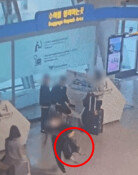Premature discussions about ‘easing of sanctions’ on Pyongyang
Premature discussions about ‘easing of sanctions’ on Pyongyang
Posted October. 20, 2018 07:24,
Updated October. 20, 2018 07:24
In the wake of Pope Francis’ expressed intention to accept his visit to North Korea, South Korea’s ruling Democratic Party is joining the government's efforts for easing sanctions against the North. “Easing of sanctions against North Korea should be considered reciprocally in tandem with the North’s denuclearization,” Democratic Party floor leader Hong Young-pyo said on Friday. “U.S. President Donald Trump also said that if denuclearization progresses to reach the 20 percent level, it will be a point of no return, and mentioned phased easing of sanctions.” Hong linked "the point of no return," which was mentioned by South Korean President Moon Jae-in as the condition for easing of sanctions, with President Trump’s "20 percent denuclearization."
Such argument clearly reveals not only its ignorance about denuclearization process and the low level of understanding within the ruling party, which always seeks to interpret the situation in its favor. It is true that President Trump made such remarks at a press conference after the U.S.-North Korea summit in Singapore on June 12. However, as misunderstanding and controversy erupted over this statement, President Trump has avoided mentioning it again. If the South Korean ruling party closely examines what President Trump actually meant and the context of his remarks, the party would not make interpretation recklessly as it pleases.
When asked by a reporter how long the denuclearization process will take, President Trump said, "A 15-year process. Assuming you wanted to do it quickly, I don’t believe that. I think whoever wrote that is wrong. There will be a point at which when you are 20 percent through you can’t go back.” He indicated that while it takes a long time until the full completion of denuclearization, it would be possible to take practical denuclearization during his term in office. Moreover, he made the remarks by assuming the condition of implementation of aggressive "front loading" such as external shipment of nuclear warheads from the North in the early phase of denuclearization.
However, the North has even declined reporting of its nuclear arsenal, or submission of the list of its nuclear weapons and facilities, as the first step in the denuclearization process. The North claims it already took preemptive measures including the demolition of its nuclear test site, but Pyongyang only took the measure unilaterally without allowing verification. Nonetheless, it is demanding the U.S. to take corresponding measures including declaration of armistice. Further, the North is still boycotting working-level denuclearization talks, which it agreed with the U.S. At a recent meeting at the U.N. General Assembly, Pyongyang also demanded the United Nations Command, which manages the armistice regime on the Korean Peninsula, be disbanded and leave, while calling it "monster."
Despite this situation, the South Korean government or the ruling party leadership has not raised issue with such moves by the North, or urged Pyongyang to denuclearize. Instead, the ruling camp is strongly demanding the need for easing of North Korea sanctions. The driving force that transforms North Korea a "Rogue State" armed with weapons of mass destruction into a "normal state" is sanctions against the North. Premature discussions about the need for easing of sanctions could not only cause Washington to have immediate suspicion and weaken Seoul's negotiating power with Pyongyang, but also induce Pyongyang to grow arrogant and take misguided steps.







